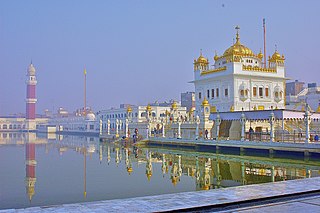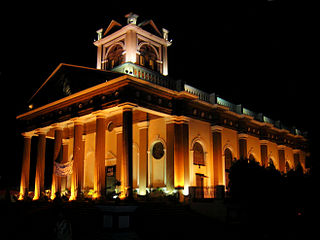
Guru Amar Das, sometimes spelled as Guru Amardas, was the third of the Ten Gurus of Sikhism and became Sikh Guru on 26 March 1552 at age 73.

Tarn Taran Sahib is a city in the Majha region of the state of Punjab, in northern India. It is the district headquarters and hosts the municipal council of Tarn Taran district. Gurdwara Sri Tarn Taran Sahib, a prominent Sikh shrine is located in the central part of the city.

Kapurthala is a city in Punjab state of India. It is the administrative headquarters of Kapurthala District. It was the capital of the Kapurthala State, a princely state in British India. The aesthetic mix of the city with its prominent buildings based on French and Indo-Saracenic architecture self-narrate its princely past. It is also known as city of Palaces & Gardens. According to the 2011 Census, Kapurthala is the least populated city in India.

Bhagat Puran Singh was an Indian writer, environmentalist, and philanthropist. As a young man he decided to dedicate his life to humanitarian work, and in 1947, he established Pingalwara, a home for the sick and disabled in Amritsar. He was also an environmental campaigner, raising awareness of pollution and soil erosion and writing many books about environmental topics.
Guru Nanak founded the Sikh faith in the Punjab region of the northern part of the Indian subcontinent, and present-day Pakistan, in the end of fifteenth century. He was first of the ten Sikh Gurus. The tenth, Guru Gobind Singh, formalised its practices on 13 April 1699. He baptised five Sikh people from different parts of India, with different social backgrounds, to form Khalsa fauj. Those five Beloved Ones, the Pañj Piārē, then baptised him into the Khalsa fold. This gives the order of Khalsa a history of around 500 years. Historical theory and analysis suggests that Sikhism came into existence during the early Medieval period of the Bhakti movement and also after repeated invasions by Muslim rulers upon the Hindu community during Mughal rule, which lasted between especially in the region of North India.

Kartarpur is a town located, in the Shakargarh Tehsil, Narowal District in Punjab, Pakistan. Located on the right bank of the Ravi River, it is said to have been founded by the first guru of Sikhism, Guru Nanak, where he established the first Sikh commune.

Tarn Taran district is one of the districts in the Majha region of Punjab, India. The main cities are Tarn Taran Sahib, Bhikhiwind, Khadur Sahib and Patti. The City of Tarn Taran Sahib is a holy place for Sikhs.

Sardar Gurbachan Singh was a Sikh scholar, professor, and author. He was born in Moonak, Sangrur district. He was a lecturer at the Sikh National College at Lahore. At the Banaras Hindu University he held the Guru Nanak Chair of Sikh Studies. He received the Padma Bhushan in 1985. He received in 1985 the National fellowship by the Indian Council of Historical Research, New Delhi.

Sikhs are a growing religious minority in Italy, which has the second biggest Sikh population in Europe after the United Kingdom (525,000) and sixth largest number of Sikhs in the world. It is estimated that there are between 200,000 to 220,000 Sikhs in Italy, constituting 0.33% of Italy's population.

Gurdawara Bair Sahib also called Baba Beri or Baba Bair is situated in Sialkot, Pakistan. It was the place where Baba Guru Nanak stayed and met Hamza Ghaus, a famous saint of Sialkot. The berry tree under which Guru Nanak stayed is still present. The gurdwara was built by Natha Singh and it includes a garden, a pool and residential rooms. The gurdwara was renovated during the 2010s and opened for pilgrims.

Gurdwara Darbar Sahib Kartarpur, also called Kartarpur Sahib, is a gurdwara in Kartarpur, located in Shakargarh, Narowal District, in the Punjab province of Pakistan. It is built on the historic site where the founder of Sikhism, Guru Nanak, settled and assembled the Sikh community after his missionary travels and lived for 18 years until his death in 1539. It is one of the holiest sites in Sikhism, alongside the Golden Temple in Amritsar and Gurdwara Janam Asthan in Nankana Sahib.

Gurū Nānak, also referred to as Bābā Nānak, was the founder of Sikhism and is the first of the ten Sikh Gurus. His birth is celebrated worldwide as Guru Nanak Gurpurab on Katak Pooranmashi, i.e. October–November.

Vijay Kumar Chopra is the chief executive officer and editor in chief of the Punjab Kesari print news organisation. He is involved in social welfare work and has received a Padma Shri award. In August 2009, he was elected by the Chairman of the Press Trust of India.

Rajkavi Inderjeet Singh Tulsi, was an Indian patriotic poet, Bollywood lyricist, and author. His writings in Punjabi, Hindi, and Urdu covered every aspect of life, including religion, romance, labor's life, country's struggles, etc. Moreover, he was known for the simplicity in his writings.
Khushdeva Singh (1902–1985) was an Indian physician and social worker, known for his contributions towards the treatment of tuberculosis in India. Born in Patiala in the Indian state of Punjab, he served at the Hardinge Sanatorium, Dharampur in Himachal Pradesh for most of his service. He was the founder of the Lepers' Welfare Society, Patiala for the rehabilitation of leprosy patients of the region. Reports credit him as a humanist with a secular vision; he was known to have treated several Muslims during the Partition of India. He is the author of the books In Dedication and Love is Stronger Than Hate. In 1957, the Government of India honoured him with Padma Shri, the fourth-highest Indian civilian award, for his service to the nation. The Padma Shri Dr. Khushdeva Singh Hospital for Chest Diseases in Patiala is named after him.

Jagtar Singh Grewal was an Indian writer, historian, scholar, and a vice-chancellor of the Guru Nanak Dev University (GNDU). After securing his Ph.D. and DLitt from London, he joined the GNDU, where he founded the Department of History. He was the first Dean of the Academic Affairs of the University and was a former member of faculty at the Panjab University, Chandigarh. After his superannuation from GNDU in 1984, he joined the Indian Institute of Advanced Study as its director.

Iqbal Singh Kingra was an Indian socio-spiritual leader of the Sikh community. He was the Founder President of The Kalgidhar Trust, The Kalgidhar Society and Baru Sahib. He was considered to be one of the most influential Sikhs in the world. He was awarded the Sikh Lifetime Achievement Award in 2016. In 2018 he was bestowed with Shiromani Panth Rattan by Takht Sri Harmandir Ji Patna Sahib. In 2022, he was conferred with the Padma Shri by the Government Of India for his contributions in the field of social work.
Khadur Sahib is a town and a nagar panchayat in Tarn Taran district of Khadur Sahib tehsil of the Majha region of Indian state of Punjab. Khadur Sahib is a historical place in view of eight out of ten sikh gurus having visited this place. The postal index number of Khadur Sahib is 143117.
Harmohinder Singh Bedi is a Hindi author, an academician and an academic administrator from the Indian State of Punjab. Since 4 July 2018, he has been serving as the Chancellor of the Central University of Himachal Pradesh. He is also a Member of the Indian Council of Social Science Research and a Member of the National Monitoring Committee on Minority Education, Govt of India. Before joining Central University of Himachal Pradesh, Harmohinder Singh Bedi had served as Professor Emeritus, Punjabi University, Patiala and as Professor and Head of Department of Hindi, Guru Nanak Dev University, Amritsar. At Guru Nanak Dev University he had also served as Dean and Director of Chairs of Bhagat Kabir, Satguru Ram Singh and Swami Vivekanand.













